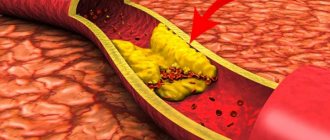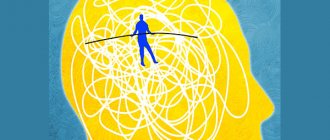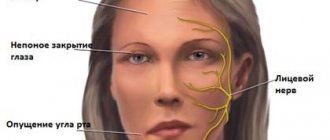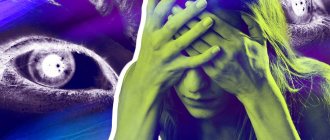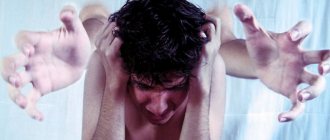Schizophrenia literally means “splitting the mind.” This is a psychotic disorder of an endogenous nature, which is expressed in a change in the patient’s perception of reality and in his social dysfunction. The disease can manifest at any age, but more often it happens in youth - at 16-30 years old. The disease manifests itself in the fact that the patient realizes himself in a different reality, where he lives by different rules and different events happen to him. In addition, his personality changes.
Modern methods of treating schizophrenia in men and women
Treatment of schizophrenia abroad is carried out in two directions - medication (pharmacotherapy) and non-drug (psychocorrection). Long-term observations have made it possible to establish that taking pharmacological drugs provides a positive result in 65% of cases, psychotherapy (i.e. treatment of schizophrenia without drugs) - in 45%, and the most successful is combination or complex therapy (pharmacotherapy + psychotherapy) - success is achieved achieve in 85% of cases.
In addition, psychological and social support is included in the treatment of schizophrenia abroad. There are special support services, social and medical assistance centers, where the patient receives comprehensive assistance, ranging from psychological counseling to employment.
There is evidence that confirms the beneficial effect of physical therapy on the course of the disease, so it is often included in a complex of therapeutic measures (the same as in the treatment of addiction).
It is this approach that is currently practiced by foreign psychiatrists; this is somewhat different from the treatment of schizophrenia in Russia, when pharmacotherapy alone is used mainly.
Schizophrenia in men and women differs in the average time of manifestation - in men it often debuts before the age of 20, in women - after 20. However, this difference is rather statistical, and otherwise the disease in both sexes proceeds similarly, and the approach to its treatment is practically no different.
Basically, therapy is carried out on an outpatient basis - the patient visits a doctor who, if necessary, adjusts drug therapy, and then schizophrenia is treated at home. At the same time, the patient visits a psycho-social assistance center, or, if for one reason or another he cannot do this, he is visited by mental health service staff.
What drugs are used abroad to treat schizophrenia?
The main group of medications for the treatment of schizophrenia are antipsychotic drugs (typical and atypical), their long-term use significantly reduces the risk of relapse. However, the therapeutic effect of antipsychotics is limited - they help improve positive (productive) symptoms, but are ineffective against cognitive dysfunction and negative symptoms.
The choice of drug is made by the attending physician with a careful assessment of risks, benefits and individual factors. Overall, 50% of patients respond positively to antisychotic therapy, 30% have a partial response, and 20% are resistant to therapy. In this case, drugs from an additional group, for example, Clozapine, can be used, but they have serious side effects that must be taken into account.
Antipsychotics can also have side effects, but they are statistically less common. Typical antipsychotic drugs can cause extrapyramidal disorders, while atypical ones can cause metabolic syndrome, weight gain, and diabetes.
For those patients who, for one reason or another, cannot or refuse to take medications, depot medications that provide long-term action are indicated. They are particularly effective when combined with psychosocial interventions.
Manifestations depending on age
The first symptoms of the disease in 49% of cases are noticeable between the ages of 21 and 30 years. In 26% of cases - from 31 to 40 years. Symptoms of patients from 18 to 25 years old imply (in addition to the classic picture of hallucinations + delusions) the loss of previously favorite hobbies and activities, emotional coldness and loneliness, and the desire to study mysticism and religion.
Young men are characterized by dysmorphophobic ideas and worries about fictitious defects in appearance. At this age, antisocial behavior, violation of laws and moral norms, and disregard for learning are more clearly manifested. Aggression in young men is more often manifested towards relatives, especially towards their mother. Attacks of auto-aggression and self-harm are possible.
Symptoms from 30 to 40 years of age are accentuated, in addition to hallucinations and delusions, by a decrease in intellectual capabilities. A person's IQ does not change, but patients find it difficult to use their intelligence in practice. Men of the older age group begin to neglect hygiene and become weak-willed. Characterized by anhedonia, the inability to experience pleasure. Apathy is another sign of illness; any motivation for activity is lost. Closedness and irritability continue to develop.
At pre-retirement and retirement age (from 50 to 60 or more years), cognitive impairment is noticeable - problems with memory and attentiveness. Elderly patients tend to blame others a lot; they lack self-criticism. Insomnia is typical - a person wakes up in the middle of the night and begins to walk aimlessly around the house. Emotional reactions are ambivalent, unstable, the mood is very dynamic. The attitude towards relatives is irritable, aggressive or indifferent.
Innovative approaches to the treatment of schizophrenia in Israel
Psychiatry in Israel has a high level of development, as it has always been focused on the latest discoveries in this field. Due to the fact that the country is a world religious center, the number of mentally ill people here is much higher than average - they come here from all over the world. It is a proven fact that religiosity is closely related to mental illness. Therefore, Israeli psychiatrists, in addition to high qualifications and advanced treatment methods, also have enormous clinical experience.
Treatment of schizophrenia in Israel is carried out using new generation medications in combination with the most effective non-drug methods. These include primarily cognitive behavioral therapy, family therapy, and assertive conjoint therapy.
Attention is paid to maintaining the patient’s social skills and physical health - in parallel with the treatment of schizophrenia itself, therapy for concomitant diseases, correction of excess weight, etc. is carried out.
The experience of Israeli specialists shows that including the family in the treatment and rehabilitation process, in the form of family therapy and/or teaching the family how to properly interact with the patient, significantly reduces the risk of relapse and allows one to avoid hospitalization.
Innovative, experimental techniques are also used - art therapy, animal therapy, drama therapy, color therapy, etc. Acting as a supplement to the main treatment, they can increase its effectiveness.
What is the psychiatric approach to treating schizophrenia in Moscow
Modern Russian psychiatry, unfortunately, remains the heir of Soviet psychiatry, which is at least significantly outdated. In the treatment of schizophrenia, as well as in the treatment of alcoholism and drug addiction, with rare exceptions, means and methods are used that are not capable of providing long-term remission; moreover, the social aspect of these diseases is often missed. The low effectiveness is confirmed by reviews of the treatment of schizophrenia in Russian psychiatric hospitals.
However, Russians can receive psychiatric medical care in accordance with the latest international standards. To do this, you need to contact the Renaissance drug treatment clinic. The name “drug clinic” should not be confusing; in addition to drug rehabilitation/drug rehabilitation, it provides treatment for mental illnesses, in particular schizophrenia.
Explore the cost of treatment for schizophrenia
To determine the cost of a course of treatment for schizophrenia, it is necessary to know the data of a particular patient - first of all, the type of disease, its duration, as well as the presence of concomitant pathology and other aggravating factors. In all cases there will be a different amount of therapy. Speaking on average, a course of treatment in Moscow and Israel will cost approximately the same.
To find out the cost of treatment for a specific patient, contact us using the online form. You need to fill it out, indicating your current contacts, and send it. After this, a clinic consultant will contact you. He will need to describe the problem and send a copy of the medical report to the email address he suggested. cards. A free online consultation with a doctor specializing in the treatment of schizophrenia may be offered, during which he can determine the amount of treatment needed.
After this, you will receive a program compiled taking into account individual data, indicating the cost of the course.
Loss of self
Depersonalization is a state in which a person ceases to feel like a separate person who has his own thinking and his own will. Often such disorders occur in patients with indolent schizophrenia, especially if the disease lasts a long time and the patient does not receive any treatment.
A person ceases to feel his thoughts, emotions and aspirations as his own - it seems to him that his psyche is controlled by someone from the outside. At the same time, he calls everything that the patient does “automatic,” emphasizing the deficit of his own personality.
Read reviews about the treatment of schizophrenia
“I know first-hand that Israeli doctors work miracles - the daughter of my friends underwent drug addiction treatment in Israel and made a full recovery. Therefore, when trouble happened, and my nephew, a boy who was a prize-winner of the Olympiads in physics and mathematics, fell ill with mental illness, he was taken to Israel, also to the Renaissance Center. And a miracle happened. Of course, we know that schizophrenia is incurable, and that he will have to take pills for the rest of his life. It’s okay, but he has become the same smart guy he used to be, and not a creature in a stupor with a dull look.”
Ekaterina Rodnina, Moscow, Russian Federation
“Schizophrenia is scary. Unfortunately, we had to find out for ourselves when my mother got sick. We rushed around to all the doctors we visited, all to no avail. She flatly refused to take medication, and that was the end of all treatment. We grabbed a thread, contacted the Renaissance clinic and persuaded my mother to go to Israel on a tour, and, as if by chance, we went to the clinic for health treatments. And then everything turned out well, after all, there are specialists there. They helped us a lot, a lot. The other person has completely become, or rather, almost the same. Now my mother is at home, taking “vitamins” and feeling great. Thank you!"
O. Fadeeva, Moscow.
Symptoms of the disease
The clinical picture can be varied, depending on the type of schizophrenia and the initial characterological characteristics of the individual. Some patients immediately fall into a long-term depressive state, others exhibit mania and aggression. General symptoms:
- hallucinations are more often of the auditory, olfactory, visual, tactile type - hallucinatory phenomena often threaten the health of the patient and his environment, and can provoke injury or suicide;
- paranoid state - confidence in the presence of a non-existent threat, conspiracy;
- incoherent speech, pretentious construction of phrases;
- obsessive ideas and thoughts - images that invade consciousness against a person’s will;
- ignoring social norms, rules of life in society;
- neglect of personal hygiene;
- loss of orientation in space;
- sexual disorders - problems with orgasm, ejaculation, erectile dysfunction, decreased libido levels or its complete absence;
- sleep problems, depression;
- aggressiveness, suspicion;
- memory problems - blackouts, difficulty remembering, false memories;
- lack of concentration - a person loses the ability to perform even light household tasks (sweeping, washing a plate, etc.);
- autism, excessive withdrawal from communication;
- mood swings, emotional reactions inappropriate to the situation, etc.
To identify schizophrenia, just a few of the listed symptoms are not enough. Manifestations must be present for a long time; only a psychiatrist can establish a diagnosis.
Delirium is the central symptom. Delusions of grandeur - a person is confident that he has made some global discoveries, that he has a special status, etc. Delusions of persecution - experiencing a non-existent threat to one’s life, being saved from non-existent pursuers or being attacked by them. This type of delusional perception and thinking is often accompanied by outbursts of hostility, anger, and aggression.
Delusion of special treatment - the patient is sure that people around him are mocking him, condemning him, threatening him, and paying him a lot of attention. Delusions of jealousy - the belief that the spouse is cheating, the search for a non-existent lover, an aggressive attitude towards his woman. Delusion of influence - confidence in influence from the outside, from a psychic or an alien being, from an otherworldly force or intelligence agency. The impact is usually perceived as dangerous and threatening.

